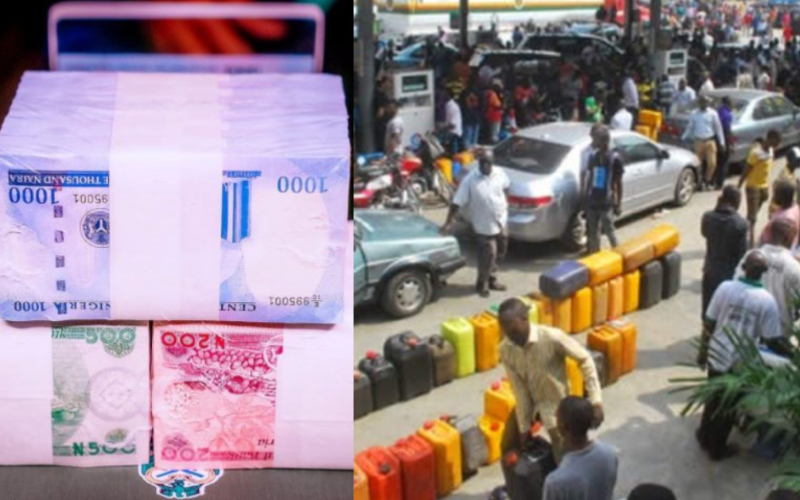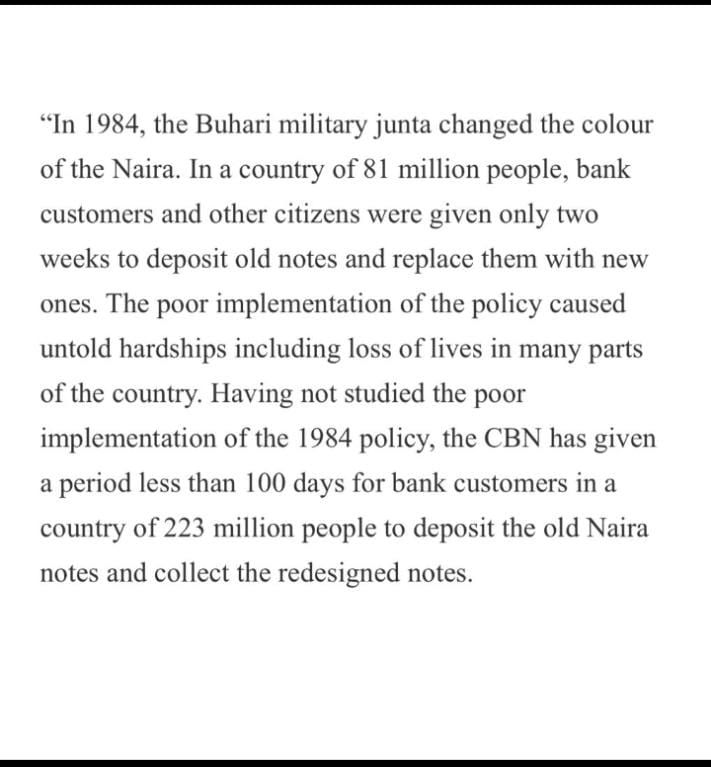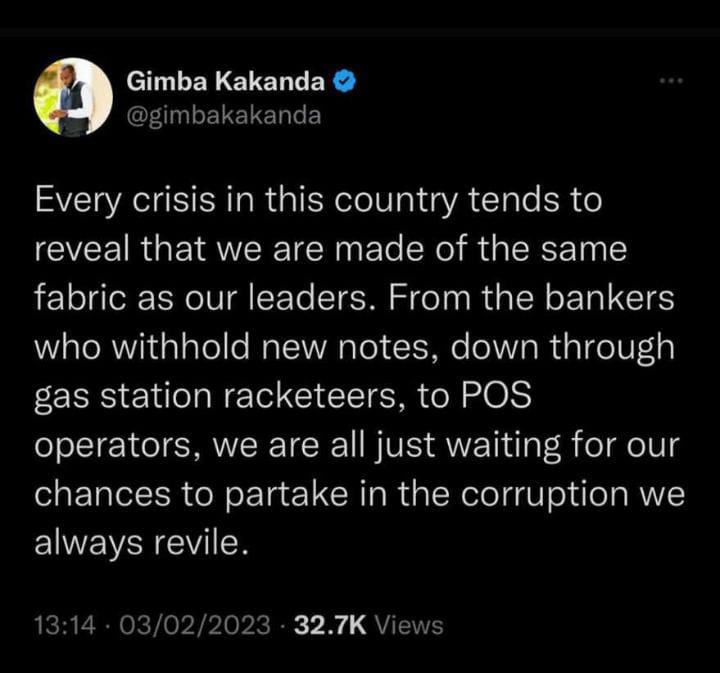Ahead of the 2023 general elections, the federal government have implemented the use of new naira notes while Nigerians are also suffering fuel scarcity.
These factors have caused an uproar amongst Nigerians as the new naira notes scarcity increases on the daily basis and there doesn’t seem to look like the fuel scarcity also plans on ending soon.
New naira notes
Governor of CBN, Godwin Emefiele announced the new naira notes which includes N200, N500 and N1000 redesign was ready on October 26, 2022 and will be effective from mid-December 2022.
When the new banknotes start to circulate, he recommended Nigerians to take their old ones to the bank so they may withdraw them.
The CBN governor noted that the decision was made as a result of ongoing issues with the management of the current series of banknotes and currencies in circulation, particularly those outside of Nigeria’s banking sector.
The Central Bank of Nigeria (CBN) insisted that the N200, N500, and N1,000 notes be phased out as the nation’s legal cash by January 31, 2023, thus all Nigerians—banked or not—were frantically trying to get rid of them from their wallets and purses.
On January 29th, 2023, CBN finally extended the deadline for the swap of old naira notes to new ones by 10 days.
The new deadline, according to Governor Emefiele was set to be on the 10th of February, 2023.
Nigerians can still deposit their old notes with the CBN directly up to February 17, 2023, which is referred to as the “grace period.”
Why was the deadline date extended? This was because Nigerians were complaining about the inability to swap their old notes to new ones due to it’s scarcity with rural areas been the most affected.
Due to the scarcity of new naira notes, PoS operators across the country increased their withdrawal charges outrageously.
An anonymous writer reminded Nigerians of a similar incidence on the redesign of naira note during Buhari’s 1984 military regime. See post below;
A twitter user, Gimba Kakanda while lamenting the country’s current economic situation said, “Every crisis in this country tends to reveal that we are made of the same fabric as our old leaders. From the bankers who withhold new notes, down through gas station racketeers, to POS operators, we are all just waiting for our chances to partake in the corruption we always revile.”
Entrepreneurng reported that Godwin Emefiele, the governor of the Central Bank of Nigeria, pleaded for patience from Nigerians, reassuring them that the new notes will circulate and be available.
As the deadline for exchanging old naira notes for new ones, February 10, draws near, the apex bank also promised to stop Point of Sale fees.
He observed the demonstrations and disputes centered on the problems people were having obtaining the new notes.
Last week, Kaduna State Governor Nasir El-Rufai drew attention to what appeared to be banks’ sabotage of the CBN under Godwin Emefiele’s leadership’s new currency strategy.
The quick-thinking and astute governor claimed that a particular state’s governor obtained 500 million new naira notes from an undisclosed bank. This was the worst kind of disrespect for the law and unrestrained power.
El-Rufai also singled out anonymous politicians who, although being the targets of the new policy, would not experience harm due to their capacity to evade the majority of economic policies.
El-Rufai claimed that politicians who are the targets of the naira redesign scheme already have their way in a recent interview with BBC Hausa Service.
His words: “I tell you this change does not affect politicians, they have their money and they are prepared, they know how to access the new notes, it is poor don’t have ways, even yesterday we were told one of the governors was given N500 million of the new notes.”
Fuel Scarcity
Nigerians have persisted in lamenting the hardship brought on by the country’s lack of petroleum products as companies and homes that rely on generators for power provision suffer in the dark.
In recent weeks, commuters have been complaining about the rippling effects of the scarcity due to skyrocketing transportation costs in key cities, while vehicles across Nigeria have had difficulty obtaining petroleum goods.
The administration has repeatedly said that it has enough petroleum products on hand, yet despite this, there is still a shortage and an inadequate supply of electricity nationwide.
The most recent development coincides with speculations that the federal government will be raising pump prices.
Timipre Sylva, the minister of state for petroleum resources, asserted that President Muhammadu Buhari had not given his approval for any price increases on PMS or other petroleum products.
“There is no reason for President Muhammadu Buhari to renege on his earlier promise not to approve any increase in the price of petroleum motor spirit (PMS) at this time,” Mr Sylva said.
A survey of gas stations across the nation revealed that prices were significantly higher than the previous pump price, ranging from N240 to N400 in all 36 states of Nigeria.
While many fueling stations charged between N200 and N250 for the merchandise, NNPC retail locations only charged N194.
Fuel costs on the illicit market have also skyrocketed, with 10 liters of gasoline costing between N4000 and N6000 in Lugbe, Jabi, Kubwa, and Gwagwalada.
Kevin Enoch, a taxi driver at the NNPC retail outlet said; “To be frank with you, this fuel issue is so pathetic, I have been in this queue since 3 p.m. to get fuel. This is 4:30 p.m. and still, it has not been my turn to get the product. As you can see there are a lot of queues here because they are selling for N194.”
Another taxi driver, Kayode Ademilekan, said “This fuel issue has become a habit in the country, I have observed this and I’m not sure our government is doing anything to address it. We are suffering in this country.”
Peter, an Abuja-based civil servant said; “At the beginning of each year, the government punishes us with fuel scarcity, that’s what happened last year and it has continued again this year. I bought fuel at the rate of N5,000 to fuel my generator on Sunday. If I continue to buy N5,000 just for the generator, how much is my salary? I just hope we vote wisely this time around.”
Another civil servant, George Abah, said: “At this time, this is too unbearable. People are suffering and the election is next month. Recently, I was at one of the fuel stations in Wuse to get fuel but I couldn’t get fuel, all I can tell you now is that the government is making life very unbearable for people.”




